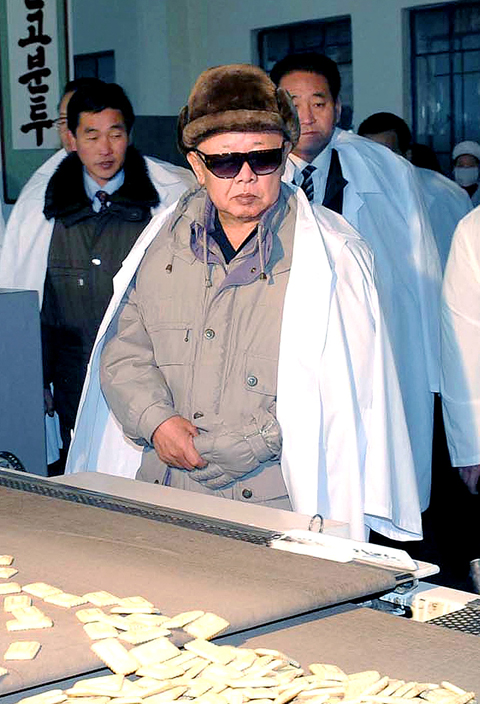North Korea’s politically motivated currency revaluation is forcing its people to barter for food to survive even though the regime promised a new year drive to raise living standards, experts said.
In an policy-setting editorial on Jan. 1, the rulers of the impoverished country stressed efforts to bring about “a radical turn in the people’s standard of living.”
But analysts said the shock revaluation of the won on Nov. 30 could intensify the already severe hardships of ordinary people.

PHOTO: AFP
“Inflation is widespread despite the regime’s desperate efforts to stabilize prices,” said Lee Seung-yong, director of the South Korean Good Friends welfare group, which has extensive cross-border contacts.
Lee said new state prices have yet to be announced following the revaluation “due to a surge in food prices and chaos in the markets, which paralyzed daily distribution of commodities and forced some people to rely on bartering.”
“This prompted authorities to further strengthen control of market activities. However, the situation is getting worse,” he said.
“Without outside help especially from China, North Koreans will suffer from shortages and high prices for a while, maybe throughout this year,” he said.
Authorities restricted the amount of old banknotes that could be changed at a rate of 100-for-one for new currency, wiping out savings and sparking widespread anger.
The revaluation was widely seen as an attempt to reassert control over the economy and clamp down on growing free-market activities. Private markets emerged after the state food distribution system collapsed during famines in the 1990s.
A Pyongyang central bank official himself called it an attempt to strengthen “socialist principles and order in economic management.”
Seoul-based Internet newspaper DailyNK also reported last week that bartering has made a comeback.
“For now, state-designated prices are still not public, so people think that selling goods for cash now would mean making a loss,” it quoted a defector who talked to his family in the North as saying.
“Therefore, bartering has become the main method of trading for the people,” he said.
The defector said the barter value of products is decided according to their value in old money, with trade carried out privately to avoid detection.
Before the redenomination, one fish was worth 1,500 won (US$11.11) and a kilogram of corn was 900 won, so people barter one fish for a little less than two kilograms of corn, DailyNK said.
“The economy worsened due to the currency change where markets were closed and the public needed necessities which were not provided by the state,” Cho Bong-hyun, of the Industrial Bank of Korea’s economic research center, told a seminar on Friday.

MORE VISITORS: The Tourism Administration said that it is seeing positive prospects in its efforts to expand the tourism market in North America and Europe Taiwan has been ranked as the cheapest place in the world to travel to this year, based on a list recommended by NerdWallet. The San Francisco-based personal finance company said that Taiwan topped the list of 16 nations it chose for budget travelers because US tourists do not need visas and travelers can easily have a good meal for less than US$10. A bus ride in Taipei costs just under US$0.50, while subway rides start at US$0.60, the firm said, adding that public transportation in Taiwan is easy to navigate. The firm also called Taiwan a “food lover’s paradise,” citing inexpensive breakfast stalls

TRADE: A mandatory declaration of origin for manufactured goods bound for the US is to take effect on May 7 to block China from exploiting Taiwan’s trade channels All products manufactured in Taiwan and exported to the US must include a signed declaration of origin starting on May 7, the Bureau of Foreign Trade announced yesterday. US President Donald Trump on April 2 imposed a 32 percent tariff on imports from Taiwan, but one week later announced a 90-day pause on its implementation. However, a universal 10 percent tariff was immediately applied to most imports from around the world. On April 12, the Trump administration further exempted computers, smartphones and semiconductors from the new tariffs. In response, President William Lai’s (賴清德) administration has introduced a series of countermeasures to support affected

CROSS-STRAIT: The vast majority of Taiwanese support maintaining the ‘status quo,’ while concern is rising about Beijing’s influence operations More than eight out of 10 Taiwanese reject Beijing’s “one country, two systems” framework for cross-strait relations, according to a survey released by the Mainland Affairs Council (MAC) on Thursday. The MAC’s latest quarterly survey found that 84.4 percent of respondents opposed Beijing’s “one country, two systems” formula for handling cross-strait relations — a figure consistent with past polling. Over the past three years, opposition to the framework has remained high, ranging from a low of 83.6 percent in April 2023 to a peak of 89.6 percent in April last year. In the most recent poll, 82.5 percent also rejected China’s

PLUGGING HOLES: The amendments would bring the legislation in line with systems found in other countries such as Japan and the US, Legislator Chen Kuan-ting said Democratic Progressive Party (DPP) Legislator Chen Kuan-ting (陳冠廷) has proposed amending national security legislation amid a spate of espionage cases. Potential gaps in security vetting procedures for personnel with access to sensitive information prompted him to propose the amendments, which would introduce changes to Article 14 of the Classified National Security Information Protection Act (國家機密保護法), Chen said yesterday. The proposal, which aims to enhance interagency vetting procedures and reduce the risk of classified information leaks, would establish a comprehensive security clearance system in Taiwan, he said. The amendment would require character and loyalty checks for civil servants and intelligence personnel prior to